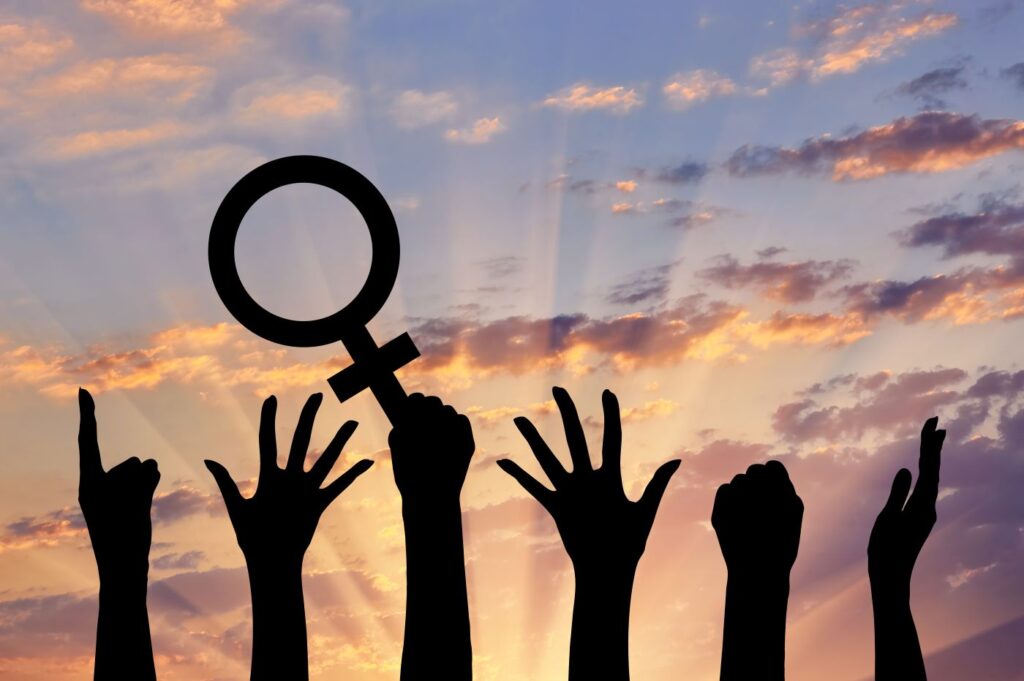Is it time to pitch feminism on the trash heap?
On the right, a growing chorus of voices insists that it is. Anti-feminism is in vogue, giving rise to a slew of new books and articles that present feminism as a baleful movement that has destroyed the family.
Self-proclaimed “anti-feminists” run the gamut from thoughtfully countercultural to openly hostile. On one end of the spectrum are influencers like Andrew Tate and Nick Fuentes, who have garnered a large social media following by parroting openly misogynistic and sexist epithets. In a similar camp are people like Hannah Pearl Davis, who gleefully heap scorn on modern women, lobbying vociferously for a repeal of the Nineteenth Amendment.
On the other end of the spectrum is a more sophisticated brand of anti-feminism, one that is less crude but increasingly visible in mainstream outlets that would never give space to the likes of Tate, Fuentes, or Pearl. One doyenne of this particular brand of anti-feminism is author and scholar Carrie Gress, whose new book, The End of Woman, argues that feminism, “perhaps second only to Marxism, is currently the most powerful brand in the world,” and that this brand has “erased women, one step at a time.” In a similar vein, Peachy Keenan’s Domestic Extremist looks to document the many precious things that “they took” from American women (the “they” is creepily underspecified). Keenan rails against “girl bosses” and names feminism as one of the “virulent viruses that plague humanity.” Another anti-feminist thinker, Jennifer S. Bryson, argued in a recent interview that “the poison in the feminist plant was part of its makeup from the start, and over the past 250 years, its fruits have been revealed.” Authors like Gress subscribe to this view that the entire plant was poisoned and rendered irredeemable.
Start your day with Public Discourse
Sign up and get our daily essays sent straight to your inbox.It’s always difficult to offer a fair assessment of sweeping historical critiques that are simultaneously vague and intensely moralistic. We’ve seen this fairly often of late in the stinging, broad-brush indictments leveled against (for instance) liberalism, capitalism, or (from the other side) “Christian nationalism” or religious faith. Typically, this type of critique begins with a carefully tailored description of the malevolent ideology, and then proceeds to draw connections to a dizzying array of harms that ostensibly follow from it. Even if the connections have some plausibility, the phenomenon in question is so deeply intertwined with other ideas and historical developments that it is impossible even to list all the complicating variables. We truly have no idea what the modern world might have looked like without liberalism (say), global markets, or feminism. But for a certain kind of critic, that uncertainty is a gift. Who can prove decisively that things wouldn’t have been better in the counterfactual universe they envision?
The Gress-Keenan-Bryson-style critique of feminism rests on the assumption that anything good in modern life could have been enjoyed without the associated negatives if only humanity had managed to avoid certain egregious errors. Thus, anti-feminists can chortle at the wild paranoia of anyone who worries that modern women might ever be prevented from owning property, getting a serious education, or running for office, while rhapsodizing over the blissful marriages, laughing children, and plates of fresh-baked cookies that we would supposedly be enjoying but for the grim influence of feminism. It’s a good example of what I call the “counterfactual fantasy.”
A Counterfactual Fantasy
In reality, the initial question of “Should we reject feminism?” is reductive to the point of making little sense. It invites no clear “yes” or “no” answer because the term “feminism” has no clear and consistent definition, and “feminism’s” effects have been both good and bad in ways that are now deeply intertwined.
As modern nations became wealthier and more democratic, embracing advanced education and the rarefaction of labor, it was inevitable that they would find themselves grappling with difficult questions about women’s appropriate role in society. Feminism, by any reasonable definition, was a part of that process of adaptation and renegotiation. While it may be convenient for rhetorical purposes to see (or define) feminists exclusively as perpetrators of error, this tendency actually inhibits us from understanding our present situation. Anti-feminists are eager to identify an enemy that they can rush forth to defeat, but the likely consequence of their advocacy is the chilling of valuable lines of inquiry. It may be difficult to sustain a serious conversation about the better and worse aspects of contemporary social mores if that conversation is continually drowned out by the reactionary demand that we exorcise all remnants of feminism and return to a romanticized traditionalism.
Even worse, anti-feminist arguments often work to legitimize a reductive, ignoble view of womanhood that has already become disturbingly visible in the overtly misogynistic thinkers mentioned above. Writers like Keenan and Gress probably wouldn’t consent to appear in a smiling photograph with Tate. But they share some important premises and are to a great extent responding to similar provocations. These kinds of parallel movements can easily feed each other.
As modern nations became wealthier and more democratic, it was inevitable that they would find themselves grappling with difficult questions about women’s appropriate role in society. Feminism, by any reasonable definition, was a part of that process.
The Undeniable Allure of Soft Anti-feminism
At the risk of degenerating into broad-brush abstractions myself, however, it is time to engage a particular anti-feminist work. Gress’s The End of Woman is the obvious candidate.
This book is somewhat hard to classify. Gress is trained as a philosopher and, unlike Keenan, she clearly intends her work to be taken at face value and not as politicized satire. Still, the book is evidently intended for a popular audience, not presented as scholarly work as such. Gress makes it clear from the beginning that she intends to examine her subjects first and foremost as biographical subjects, arguing that the most important connecting thread among feminists is that “all of these women were broken” by unhappy life experiences, with their emotional pain and heartbreak supplying the true “motivation for their thought.” Their lives are related in some detail, but their key texts tend to be glossed rapidly. Gress also makes the odd choice to refer to feminist thinkers primarily by their first names, not by their last names as would be standard in works of scholarship. This gives readers the feeling of reading a kind of “lives of the feminists” narrative, featuring tragic anti-heroines instead of saints. Since the book is not focused on scholarly analysis, Gress’s position on key philosophical or anthropological questions must for the most part be gleaned from the commentaries offered along the way.
Fortunately, Gress does provide a fair amount of useful material, offering the broad contours of a theory that can be analyzed and critiqued. She contends that feminism has, from its earliest origins, been rooted in deep and damning mistakes about the nature of woman. Starting with Mary Wollstonecraft, and continuing through such twentieth-century feminists as Kate Millett and Gloria Steinem, Gress identifies certain commonalities that she regards as defining. Some of these do reach the level of theory. Women, Gress contends, have been hamstrung by their refusal to embrace their uniqueness vis-à-vis men. They preferred to mimic the perfections of men instead of celebrating their own defining social contribution: maternity. As an antidote to this sort of pointless imitation, Gress recommends avoiding the “sterile” premise that treats womanhood as a particular manifestation of a rational human nature shared by both sexes. This destructive line of thought, descending from Wollstonecraft, focuses on rationality as a defining aspect of woman’s nature, and in so doing it “begins the neutering of the concept of female, driving it away from the maternal, and supplies the foundation for equating men and women in a way that denies any difference between the sexes.”
Envy is an important concept in Gress’s analysis. Early feminists like Wollstonecraft, she argues, laid the foundation for the feminist project by demanding to be recognized as rational, political creatures (just like men); later feminists figured out how to bring these demands to fruition through abortion, a war on the patriarchy, and the destruction of the family. In her discussion of second-wave feminism, Gress ruminates at length on women’s “envy-driven identity,” explaining that:
For over fifty years, women have been clamoring to make themselves into men—mentally and now biologically—but in the scramble we have frittered away what it means to be a woman. The solid ground that used to be beneath our feet has eroded into the sea, leaving nothing to stand on. Our identity has been cobbled together with this grasping at manhood, while what it means to be a woman has dissolved and is now an unanswerable question. There’s no place left to see what womanhood is, so enshrined have we made the male model and the neutral notion of person, human being, or individual. In our envy, women have been erased.
An envy-driven identity certainly sounds bad. But that diagnosis raises the obvious question: what is womanhood? What does it really mean? Gress supplies an answer and devotes the last chapter of her book to it: a woman is a mother. Maternity defines womanhood as the thing for which women should be known and valued—the thing that should give their lives meaning. That maternal identity can be lived out literally or in some more metaphorical way, but motherhood must, in some sense, be at the center of any well-lived female life because it is the “one thing only women can do.”
The dichotomy Gress sees here is very stark. Women can press forward with our envy-driven quest to “be like men,” demanding to be included in traditionally masculine pursuits, and dwelling fruitlessly on “sterile” discussions of our personhood and rational human nature. Or, we can “come home to ourselves, as women and as mothers,” rededicating ourselves to homemaking and “returning to the ancient wisdom that ‘we are here to serve [our children].’”
It is a shame that Gress did not engage feminist texts more directly, because her argument faces a very serious problem, which is well articulated by many feminist thinkers, including Mary Wollstonecraft, Dorothy Sayers, and Simone de Beauvoir. However, one need not immerse oneself in feminist texts to grasp the issue. Gress seems not to grasp the significance of the fact that women are rational, which fact is quite central to any discussion of virtue or of human nature broadly. Many of the pursuits that Gress dismisses as “envy-driven” can be better understood as part of an effort to actualize real human potentialities. If women are rational human beings, and the moral equals of men, it is only fitting that they should strive to cultivate the virtues and exemplify real human excellence. But such excellence cannot be neatly bifurcated into masculine and feminine forms.
The problem Gress and other similar thinkers run into is quite a barrier for anyone determined to defend a maximalist view of sexual difference. Reason is intimately connected to the intrinsic dignity and worth of all persons. Aristotle explained that the capacity to reason elevated human beings above the rest of the natural world; we are set apart by our ability to grasp the nature of things and to use that understanding to pursue good ends. In a Christian anthropology, the capacity to love is taken to be primary, but this is not as big a shift as one might initially think. To love a thing truly we must grasp its nature, and our more general capacity to grasp the nature of things is what enables us to order our loves properly. A human being’s intrinsic worth and dignity derive from this capacity to reason and love which cannot, as such, be sexed.
Even though men and women are clearly different in certain ways, they share in a common human nature (“made in God’s image and likeness”) that opens the possibility of both sexes’ enjoying the beauty and dignity of virtuous living. Sex affects human life, but its precise relevance to activities, goals, and social roles can be hard to discern, and it is therefore unsurprising that men and women have always been engaged in an ongoing process of exploration, negotiation, and discovery vis-à-vis one another.
Even though men and women are clearly different in certain ways, they share in a common human nature that opens the possibility of both sexes’ enjoying the beauty and dignity of virtuous living.
A Lost Sense of Complementarity
Anti-feminists like Gress seem determined to see the differences between men and women as categorical in ways that are deeply defining of every individual’s potential and life purpose. Some hard problems follow from that inflexible view. I would suggest that it is not possible to hold simultaneously 1) an ancient classical view of virtue, 2) a robust sexual complementarianism, and 3) the view that the sexes are morally equal. If women are simply less rational than men, it might make sense to relegate them to a subsidiary social role with a restricted range of activities and liberties (just as children are so restricted). But if that were the case, we would have to acknowledge (at least if we understand virtue in a broadly Aristotelian sense) that women are morally inferior to men. They can’t manifest human excellence to the same extent, which justifies their more restricted range of liberties and opportunities. If, on the other hand, women are men’s moral equals, and are equally capable of cultivating virtue, then it seems obtuse to assume that their desire to be treated as rational persons and full-fledged citizens is driven by envy or a hatred of maternity. Perhaps women desire political rights, advanced education, or a broad range of opportunities simply because these advantages befit rational beings.
Because it is of the utmost importance to Gress to view sexual difference as deeply defining of human nature, women end up being effectively “assigned” to be not-men, intentionally building our lives around the things that most distinguish us from males. This does seem very similar to what de Beauvoir meant when she described women as “the second sex.” Men can simply pursue rational excellence as such, while women are expected to prioritize sexual distinctiveness over the unfolding of their own particular potentialities.
It is wise to be wary of arguments that downplay the significance of recognizing any particular group of people as “rational human beings.” Once that reality is dismissed, all sorts of reductive or dehumanizing positions may start to seem plausible. At the conclusion of The End of Woman, therefore, thoughtful readers might pose a number of potentially troubling follow-up questions, which could reasonably be presented to the anti-feminist movement more broadly.
Is it important for women to have political rights? Gress never argues that they shouldn’t, but really, what’s the point? We have been told that the activists who demanded such rights were motivated by envy and working from a deeply flawed philosophical paradigm; meanwhile, women have been mothering for millennia without (in most cases) being able to vote or hold political office. Are there other grounds on which to defend the Nineteenth Amendment, or should we just jettison it, as figures like Davis would recommend?
By a similar token, it is difficult to see how Gress could persuasively argue for women’s just inclusion in almost any non-domestic activity or endeavor. Why should boardrooms or other elite jobs be open to women? What’s the point of enabling nurturers to pursue advanced degrees? Gress does state in her introduction that she “is not arguing that we should go back to the 1780s, or the 1880s, or even the 1950s,” and that she “is grateful for the opportunities” that she has had as a woman. She nevertheless thinks it “would have been possible to achieve what we have as women without erasing women altogether.” That kind of qualification is typical of counterfactual fantasy; Gress doesn’t want her readers worrying about the more unpalatable implications of her view. But given the entire rest of her argument, it is difficult to see why women should be grateful for opportunities to do non-maternal things. Isn’t the very desire for such goods inspired mainly by envy? If maternity simply is the telos of womanhood, I’m not sure what the justification would be for mothers of five (say) holding doctorates in philosophy.
But perhaps there is a justification. Perhaps advanced education could help women be better mothers, developing their rational powers and helping them to grow in virtue. A virtuous, discerning woman might offer better guidance to her husband and children alike. And, drawing on her domestic experience, she might have much to offer as a citizen as well.
If Gress did want to develop such a position, she might warm to the sort of argument that:
As the rearing of children, that is, the laying of a foundation of sound health both of body and mind in the rising generation has justly been insisted on as the peculiar destination of women, the ignorance that incapacitates them must be contrary to the order of things. And I contend that their minds can take in much more, and ought to do so, or they will never become sensible mothers.
If women are rational beings, developing the relevant potentialities will leave them better suited for all other activities, including motherhood. It’s a good starting place for defending female education, while still taking seriously the importance of the maternal vocation. And as it happens, the above quotation comes from Wollstonecraft’s Vindication of the Rights of Woman. Perhaps Gress, and her fellow anti-feminists, should give the first feminists another chance.
The appeal of anti-feminism is obvious in an era when the family seems to be eroding and when confusion about the nature of the sexes runs so deep. Modern society is plagued by some deadly errors; if we could track those back to their original sources and slay them, it seems like things might improve. This is the kind of quest that typically motivates counterfactual fantasy. In the end, though, it does not help matters to substitute one kind of error for another.
Women are potential mothers, and that is a very important truth. But they are also rational beings, which is no less important. There is no substitute for a painstaking effort to recognize the truth in all its complexity. If we truly wish to value womanhood and the many goods women can offer to the world, we must soldier ahead on that quest.
Image by Prazis Images and licensed via Adobe Stock. Image resized.














